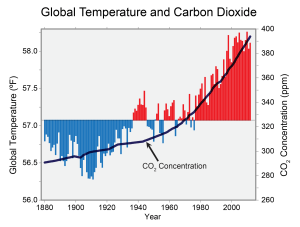We have much more to do and your continued support is needed now more than ever.
Don’t Double Down on Denial
Part 1: The New Evidence
(Note: This is the first of a three-part series. Wildlife Promise will release Part 2 “Wildlife at Risk” on May 27 and Part 3 “Sportsmen and Women Have a Key Role in Curbing Climate Change” on June 1)
The first National Climate Assessment in almost 15 years was released earlier this month, and it in no uncertain terms outlines the many disastrous consequences we as a nation are currently facing — and our children and grandchildren will face with even more severity in the future — if we do not address climate change now. ![SmokeStackSunset_Dawn-Flick_219x219[1]](https://blog.nwf.org/wp-content/blogs.dir/11/files/2013/06/SmokeStackSunset_Dawn-Flick_219x2191.jpg)
That climate assessment was just one of several reports released in the last couple months that should give everyone cause for serious alarm. These include the Intergovernmental Panel on Climate Change’s report written by United Nation scientists that details the devastating effects of climate change on a global scale, and the CNA Military Advisory Board’s report written by 16 retired U.S. military generals and admirals with more than 500 years of collective military service that offers clear evidence that the projected effects of climate change “will be more than threat multipliers, they will serve as catalysts for instability and conflict.” To make matters worse, scientists in Antarctica recently released two reports noting that Antarctic glaciers are melting much faster than originally thought.
I don’t know about you, but this scares the living daylights out of me, and makes me want to do something about it. Sadly, even though the science is clear and not really debatable, the political science in this country is murky and very contentious, which is turn makes it very difficult to curb — let alone halt and reverse — climate change. The misinformation generated by climate change deniers is causing inaction, and inaction is something no one can afford. We may have only a decade or two before it’s too late to reverse what has already begun. Already the question isn’t, “Will we be affected by climate change?” but “How badly and where will be hit the worst?” and even more importantly, “What can we do about it?”
Americans need to take the lead
A 2013 Pew Research poll conducted in 39 countries found that only 40 percent of Americans see global climate change as a top global threat, ranking sixth in the minds of Americans. The same poll notes that when the responses of the 39 countries are calculated as a whole, climate change is seen as the top global threat. Thirty years ago many of us hadn’t even heard of climate change, 20 years ago many of us denied it was occurring, and 10 years ago many of us denied that it was caused by humans, but today there is no more room for denial.
Many people reading this may have never been a climate change denier, but all of us know someone who still is.

Bill Kortenbach in his book “Counterpredators” wrote, “Denial does not solve the problem. Denial does not make the problem go away. Denial does not give us peace of mind, which is what we are really seeking when we engage in it. Denial is a liar. It compounds the problem, because it keeps us from seeing a solution, and taking action to resolve it.”
Many, many people around the country and the world are already seeing the effects of climate change, and it’s not just us wildlife enthusiasts. In the United States, we are seeing 100 year floods every couple of years in some places, with 100 year droughts every couple years in others, and that’s just the tip of the melting iceberg. It’s hard to be in denial when you have lost your crops in a drought, your business in a hurricane, or your home in a wildfire. As all the new reports clearly indicate, this isn’t just about an uncertain future for our kids and grand kids, it’s also about the negative social, environmental and economic consequences of inaction that are happening right now.
Curbing, halting and reversing global climate change will not be easy. It will take many hard decisions and actions that will have negative consequences for some people, but those decisions and actions must be taken. I can almost understand (but not really) why polluters and the politicians they’ve paid for have doubled down on denial, but that doesn’t mean the average American has to follow. If you are still a denier, you can fold your cards and get another hand. It’s perfectly okay to change your mind and become part of the solution. Actually, it’s more than okay, it’s vital.
![]() A great place to start is by taking action quickly and effectively right now. The Environmental Protection Agency has the authority under the Clean Air Act to protect us from the impacts of carbon pollution. Incredibly, nearly 40% of all U.S. carbon pollution comes from just one source – power plants. Limiting emissions from power plants is a critical step towards curbing climate change, and putting these pollution rules in place is important action on the road to denial recovery.
A great place to start is by taking action quickly and effectively right now. The Environmental Protection Agency has the authority under the Clean Air Act to protect us from the impacts of carbon pollution. Incredibly, nearly 40% of all U.S. carbon pollution comes from just one source – power plants. Limiting emissions from power plants is a critical step towards curbing climate change, and putting these pollution rules in place is important action on the road to denial recovery.
Check out Part 2 of this blog on May 27 to see what reports say about how wildlife will be affected by climate change, and dig deeper into trout and moose populations already seriously distressed by warming temperatures.





















